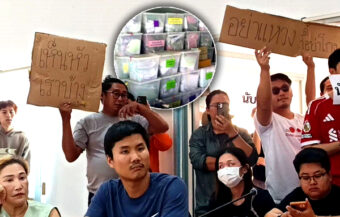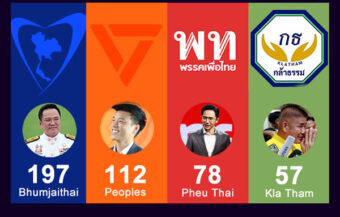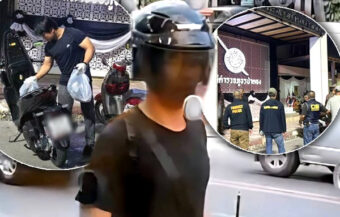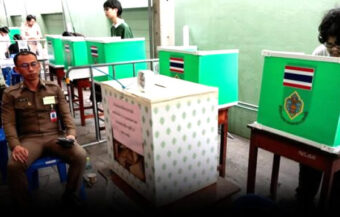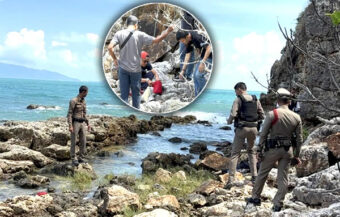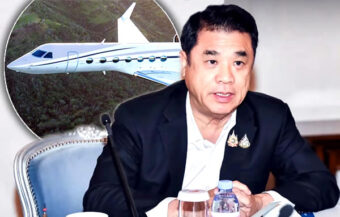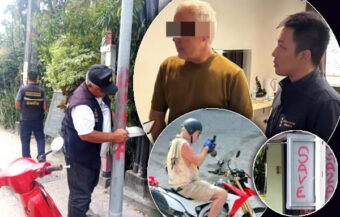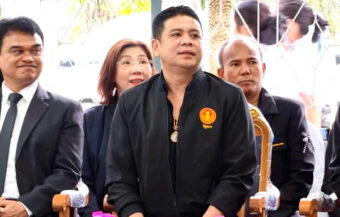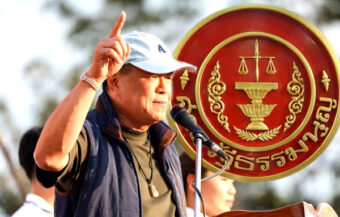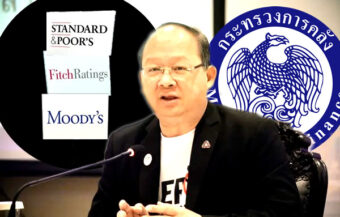Thailand tightens foreign tourist visa rules as authorities crack down on scams and illegal stays. Visa extensions are now limited, border runs targeted, repeat offenders face entry bans, while genuine tourists on short visits remain largely unaffected.
Thailand has slammed the brakes on foreign tourist visas as of last Thursday amid rising concerns over border security and illicit scam compounds in neighbouring countries, particularly Myanmar, Cambodia, and Laos. Under the new rules, foreigners can get only a seven-day extension on their second visa application at an Immigration Bureau office, and authorities are cracking down on so-called ‘border runs,’ with anyone trying this more than twice risking outright denial of entry.
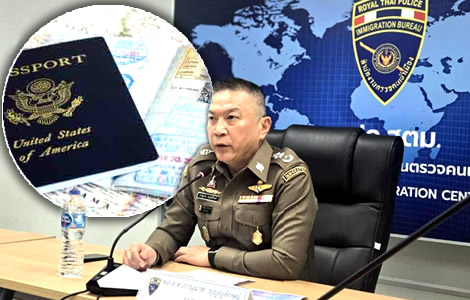
The Royal Thai Police announced a far stricter visa regime on Thursday. Police Lieutenant General Panumas Boonyalug, chief of the Immigration Bureau, made the announcement. The new rules specifically target foreign tourist visa extensions. They follow reports of abuses linked to scammer gangs and online fraud.
Recently, authorities discovered foreign scam-compound employees were readmitted after deportation. Later, they transited to Myanmar, bypassing prior restrictions. Consequently, officials emphasised stricter entry controls to prevent repeat incidents.
Since Prime Minister Anutin Charnvirakul took office in mid-September, foreign-owned businesses in Thailand’s South have faced unpredictable scrutiny. Moreover, immigration authorities confirmed these measures align with broader enforcement trends. They particularly aim to curb the misuse of tourist visas for prolonged stays.
Stricter visa rules announced to curb prolonged tourist stays and prevent illegal high-risk visitors
Under the updated rules, foreign tourist visas may only be extended twice. First, extensions will last 30 days. Second, they will last seven days. Therefore, visitors from 93 countries previously allowed 120 days now face a maximum of 97 days.
For countries that originally received 30 days, the total stay is capped at 67 days. Additionally, same-day departures and reentries are prohibited. However, some visa border runs may remain permissible. Authorities warned that repeated patterns of visa runs may result in entry denial.
The Immigration Bureau stressed that long-term residents must apply for the correct visa type. Otherwise, extensions will be refused. The crackdown follows reports of foreigners using the 60-day visa exemption to work illegally. Many repeatedly conducted border runs to obtain extra time.
Most tourists will remain unaffected, as visits typically last about two weeks. Moreover, travellers with confirmed return flights will continue to receive entry. The focus is on individuals with multiple visa-exempt stamps combined with frequent in-country extensions.
Tourist visa extensions strictly limited to two periods with short stays and reentry restrictions enforced
Police Lieutenant General Panumas convened a meeting on Wednesday, November 12, 2025. Deputy commissioners and commanders under his jurisdiction attended. They established four key actions to enforce the new policy.
First, the Bureau will elevate screening of individuals frequently using visa-exempt entries for border runs. Any person exceeding two entries without justification may face denial of entry. Authorities said this targets misuse of tourist visas for non-tourist activities.
Second, authorities will intercept foreign nationals with watch-list records at border areas. Mae Sot in Tak Province is a primary checkpoint due to its proximity to scam hubs. Moreover, deported individuals from the Mae Sot–Myawaddy border are banned from reentry without exception.
Third, provincial immigration offices will strictly grant temporary stay extensions. Foreigners with documented visa-run behaviour may have extensions denied. Authorities may also revoke existing visas and deport individuals who abuse the system.
Immigration bureau outlines four key measures to prevent repeated border run abuse and illegal activity
Fourth, all Immigration Bureau divisions will launch a mass sweep of overstaying foreigners. Authorities intend to achieve measurable operational results. Officials noted these actions may slow passport checks. However, they assured that tourism will remain unaffected.
Authorities stated that these measures target tourists working illegally and who abuse regulations. Genuine visitors with short-term travel plans are expected to continue without disruption.
Since the introduction of the 60-day visa exemption, a small number of individuals have exploited the system. They conducted repeated border runs and extended stays illegally. Therefore, authorities aim to close these loopholes.
The updated rules restrict foreign tourist visa extensions to two occurrences only. The first extension is 30 days; the second is seven days. Consequently, visitors from previously exempted countries can extend their stays for only 37 days.
Enforcement focuses on closing loopholes and ensuring tourists adhere to strict extension limits
Authorities clarified that while same-day reentry is generally prohibited, some border runs may still be permitted. Immigration officers will monitor patterns closely. Repeated misuse may lead to visa denial or revocation.
The Immigration Bureau confirmed that travellers seeking long-term residence must apply for the correct visa. Authorities emphasised that ordinary tourists will not be affected. Only visitors with multiple in-country extensions combined with frequent entries are targeted.
The crackdown follows cases where previously deported foreigners were readmitted and later transited abroad. Officials said they aim to prevent such abuses in the future.
The campaign reflects a broader effort by the government to enforce border security and regulate foreign presence. Watch-list data and records from previous deportations are being used to screen high-risk individuals. Entry denials are based on documented behaviour, authorities stressed.
Government campaign targets high-risk travellers and enforces stricter border controls nationwide
The measures follow directives from Prime Minister Anutin Charnvirakul and Police Commissioner General Kittirat Phanphet. The rules target individuals abusing visa exemptions, not ordinary tourists. Immigration operations prioritise law enforcement while allowing legitimate travel.
Provincial offices are instructed to scrutinise temporary stay extensions carefully. Officials may revoke visas for repeated violations. Mass sweeps of overstayers will continue nationwide to ensure compliance with immigration laws.
Authorities repeatedly stressed that tourism overall will remain largely unaffected. The goal is to protect visitors who follow regulations while preventing illegal stays. Short-term travellers with confirmed flights are expected to encounter no disruption.
Police Lieutenant General Panumas highlighted that abuse often involves combining border runs with in-country extensions. These loopholes will be closed. Travellers using visas properly should face no problems.
Visa misuse crackdown continues with mass sweeps and targeted inspections for repeated offenders
The Royal Thai Police and Immigration Bureau confirmed these steps are necessary to combat fraud and illegal employment. They are part of coordinated policy directives from senior government officials. The announcement confirms a firm approach to border and visa control.
Foreign tourists planning long-term stays are advised to apply for appropriate visas. Short-term visitors should maintain normal travel patterns. Immigration will enforce penalties against misuse.
Authorities reaffirmed that tourism will continue without major disruption. However, repeated abuse of visa-exempt entries may lead to denial of entry or visa revocation. The campaign is ongoing and focuses on illegal activity along Thailand’s borders.
The new crackdown combines tighter entry screening, stricter temporary extension rules and mass operational sweeps against overstayers. Immigration officers have warned that violators face swift deportation. Authorities expect the rules to deter misuse effectively.
Immigration officials stress compliance and strengthen monitoring to prevent illegal stays and fraud
Officials emphasised that short-term tourists with standard itineraries will continue to receive entry. Meanwhile, border and immigration officials will enforce the rules strictly, without exception.
The Immigration Bureau said the crackdown will increase operational efficiency in preventing illegal activity. Furthermore, authorities warned that anyone using visa exemptions for commercial or unauthorised work could face immediate consequences.
The measures also respond to intelligence showing foreign nationals previously deported were reentering Thailand. Consequently, the government aims to prevent this loophole from recurring.
Immigration officials stressed that all actions are documented and monitored. In addition, denials, revocations, and deportations follow established legal procedures. However, tourists complying with visa rules are unaffected.
Border security and visa enforcement strengthened nationwide with new targeted monitoring measures
Authorities stated that these regulations aim to strengthen border security and enforce visa compliance. Mass sweeps, targeted inspections, and monitoring of high-risk travellers are central to the policy.
Certainly, the Royal Thai Police and Immigration Bureau have set a firm stance. Foreign tourists misusing visa exemptions will face restrictions. Ordinary visitors travelling legally should experience no change.
Crackdown on expats working illegally deepens. Italian on Koh Phangan is arrested for woodwork
Ten arrested and two illegal hostels shuttered on Koh Phangan as fierce crackdown continues on the island
Crackdown aimed at upending foreign business trade moves from Koh Phangan to Phuket. Four arrested
Russian arrested at a motorbike rental business and for retailing illicit substances on Koh Phangan
At this time, it is additionally being reported that the government is reviewing the 60-day exemption available to 93 countries. Some parts of the foreign tourism business argue it is critical to the industry, while there are rising voices among the Thai public calling for a tighter regime.
Indeed, since the government of Prime Minister Anutin Charnvirakul took power in September, there has been an unprecedented crackdown on foreign-owned businesses, particularly in Southern Thailand.
This campaign continues, with officials last week promising to extend the campaign to 11 provinces nationwide.
Join the Thai News forum, follow Thai Examiner on Facebook here
Receive all our stories as they come out on Telegram here
Follow Thai Examiner here
Further reading:
Crackdown on expats working illegally deepens. Italian on Koh Phangan is arrested for woodwork
Crackdown aimed at upending foreign business trade moves from Koh Phangan to Phuket. Four arrested
Crackdown to wipe out foreign business abuses and ownership on Koh Phangan & Koh Samui intensifies
Arrogant Lebanese man held on Koh Phangan for illegal bike rental racket after being deported before



